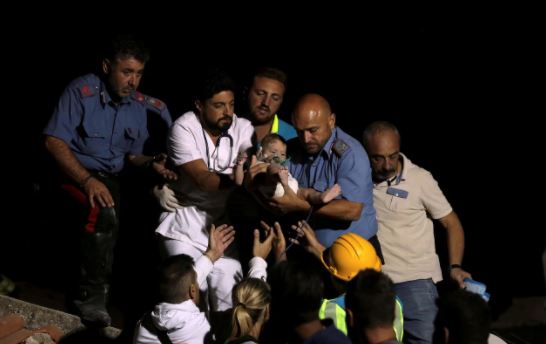Quake kills two on Italian holiday island, young brothers saved
- Major quake jolts Chile tourist region on Christmas Day
- High School student invents Earthquake Resistant House
- Dozens of buildings collapse after 6.5 quake in Indonesia
- Magnitude 7 offshore quake shakes Central America, no damage seen
Tourists and residents on the island off the coast of Naples ran out onto the narrow streets after the quake wrecked a church and several buildings. Fearing aftershocks, many decided to leave the island early.
Rescuers found a baby boy called Pasquale in the wreckage and pulled him out alive in his nappy early on Tuesday, seven hours after the shock. There was a hush followed by loud applause.
 |
| Italian Carabinieri police officer and a doctor carry a child after an earthquake hit the island of Ischia, off the coast of Naples, Italy August 22, 2017. |
Fire crews found his brothers Mattia and Ciro, aged seven and 11, stuck under a bed nearby. They kept talking to them and fed water to them through a tube.
"I promised them that after this was all over we would all go get a pizza together," one emergency worker said on Italian television.
They freed Mattia late on Tuesday morning and later extracted Ciro more than 16 hours after the quake hit. The parents were safe because they were in another room.
They said Ciro had probably saved his brother's life by shoving him under the bed when the quake struck.
"The rescuers were great. We really have to thank God for this miracle," said the island's bishop, Pietro Lagnese.
About six buildings in the town of Casamicciola, including a church, collapsed in the quake, which hit at 8:57 p.m. (1857 GMT) on Monday. The walls of one were ripped open, exposing a kitchen with a table still set for dinner.
Italy's National Institute of Geophysics and Vulcanology put the magnitude at 4.0, revising it up from an initial 3.6, but both the U.S. Geological Survey and the European quake agency estimated it at 4.3.
It struck three days before the first anniversary of a major quake that killed nearly 300 people in central Italy, most of them in the town of Amatrice.

